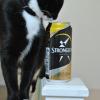
Waterless Coolant
#1

Posted 17 October 2012 - 07:15 AM
Has anyone used this stuff?
I saw it on Wheeler Dealers last night (I know this is not a good place for good mechanical tips but I'd love that workshop)
If you have used it, what is it like?
Is it good value for money?
Would you recommend it?
#2

Posted 17 October 2012 - 07:19 AM
It's very expensive, like £90 per bottle and if you don't know the condition of your rad lol.
#3

Posted 17 October 2012 - 07:21 AM
But when I read stuff like this: -
Traditional water based coolants regularly cross the thermal boundary that separates efficient Nucleate Boiling (A) from inefficient Critical Heat Flux (CHF). Critical Heat Flux (CHF) is synonymous with the condition ‘Departure from Nucleate Boiling’ (DNB). When DNB occurs a layer of steam bubbles form adjacent to the engine hot-spots (B). Steam dissipates less than 1/30th of the heat that water does, rapidly over-heating local metal, causing premature detonation.
... my immediate reaction is 'con!'....
How much is it...?
How many of us have ever suffered from inefficient Critical Heat Flux?
Edited by Barman, 17 October 2012 - 07:22 AM.
#4

Posted 17 October 2012 - 07:26 AM
http://www.theminifo...-evans-coolant/
#5

Posted 17 October 2012 - 07:27 AM
I'm sure many of us have suffered from overheating minis, but I think fixing the cause rather than the effect is a more sensible option!
That's why I'm asking for peoples opinions really,I'm not going to rush out at 9am and buy it or anything
#6

Posted 17 October 2012 - 07:28 AM
Responses from two well respected TMF members when I asked this a few weeks back....
http://www.theminifo...-evans-coolant/
That's that decision made then!
#7

Posted 17 October 2012 - 07:47 AM
#8

Posted 17 October 2012 - 07:58 AM
It has been discussed quite sensibly on Ten-Tenths too
http://www.ten-tenth...ad.php?t=133692
Interesting read, thanks
#9

Posted 17 October 2012 - 09:05 AM
#10

Posted 17 October 2012 - 12:12 PM
I found several of the product claim statements misleading. (The following red text is from the product description pages)
No Water - No Pressure
This is supposed to be good somehow. When you raise the operating pressure of a cooling system you raise the boiling point of the cooling fluid. OK... why is the pressure "bad"?
Classic Cool 180° allows your cooling system to run at a lower pressure, reducing the strain on engine components.
They are implying that 15 PSI will damage things in your engine OR suggesting it takes more effort to pump pressurized water? Hogwash.
No Water - More BHP
They need to explain that one more. They imply that they prevent detonation by improving cooling at VERY LOCALIZED and concentrated hot spots. For this to really be a problem the engine would have to have some very sharp, thin metal sections, without good fluid cooling, in the combution chamber to have extreme localized hot spots. I don't see that in the A-series engines. If you can think of such a spot, I am open to suggestions.
No Water - No Overheating
The claim is... no boil over. Boil over is a symptom of overheating. Preventing boil over does NOT mean the engine isn't hot or overheating. The Evans product specs say it boils at 180oC. If the engine reaches that temperature... you are overheating anyway but you have not had a boil over to warn you to stop. Of course... you should still be watching the temperature gauge every now and then!
While this may not be snake-oil, it does seem to be an expensive product that may have great industrial applications... but may not be practical or necessary for a daily-driver car.
#11

Posted 17 October 2012 - 12:30 PM
#13

Posted 17 October 2012 - 01:00 PM
The lower the coolant temperature, the greater the temperature gradient between it and the engine and the more heat it will remove. Of course the flip side is you then have a lesser gradient across the radiator, which is why a bigger radiator takes some beating.
The claims about steam are interesting, do they know how refrigeration works?
#14

Posted 17 October 2012 - 01:14 PM
Says its much better!
If you have bought a new radiator you know your head is nice and clean then putting water through the system will corrode it and so on. but this stuff doesnt.
its coolant for life so you never have to renew. It is bloody expensive though!
http://www.greencarr...-mpg-10-percent this will explain it better, scroll down to the video.
#15

Posted 17 October 2012 - 01:40 PM
The engine is still required to run at the same operating temperature range to be efficient and to remove the possibility of engine damage.
Engines don't boil because they have the wrong or less efficient coolant fluid, they boil or run too hot because there is a fault in the cooling system.
In some warmer climates it is common to run a high percentage of anti-freeze (glycol) in the system to raise the boiling point, but this is a panacea for engines with poor cooling systems and, as said above, if an engine runs hot in a hot climate the radiator is too small assuming the rest of the system is in good order.
Is the suggestion that if you are using this 'stuff' you can continue to drive safely even if the engine temperature goes right up to, say, 150 deg C or even until it seizes?
1 user(s) are reading this topic
0 members, 1 guests, 0 anonymous users




















